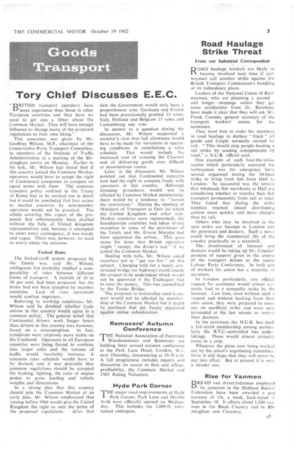Tory Chief Discusses E.E.C.
Page 7

If you've noticed an error in this article please click here to report it so we can fix it.
" RITISH transport operators have
Li more experience than those in other European countriesand they have no need to get into a tither about the Common Market. They will have enough influence to change many of the proposed regulations to their own liking."
This assurance was' given by Mr. Geoffrey Wilson. M.P., chairman of the Conservative Party Transport Committee, to members of the Institute of Traffic Administration at a meeting of the Birmingham centre on Monday. Earlier in his talk, Mr. Wilson had' stated that if' this country joined the Common Market, operators would have to accept the right of Continental companies to compete on equal terms with them. The common transport policy outlined in the Treaty of Rome had to be worked out in detail but it could be concluded that free access to market countries by non-member operators would not be practical. The article covering this aspect of the proposals had unfortunately been drafted without the help of United Kingdom representatives and, because it attempted to cover every contingency, it was wordy and vague: There was, however, no need to worry about the outcome.
Forked Rates
The forked-tariff system proposed by the Treaty was, said yr. Wilson, ambiguous but probably implied a comparability of rates between different forms of transport. A latitude of -10 to 30 per cent, had been proposed, but the terms had not been accepted by member countries. Lack of rates agreement would confuse expOrters... •
Referring to working conditions,. Mr. Wilson said he doubted Whether' trade unions in this country would agree to a common policY, , The general belief that Continental drivers work longer hours than drivers in this country was, however, . based on a misconception. In fact, conditions were relatively more stable on the Continent. Operators in all European countries were ,being forced to combine into larger units and the volume of traffic would inevitably increase. A -common rates schedule would have to be devised, and it was desirable that "-common regulations should be accepted for braking, lighting, the ratio of engine power to gross loading and vehicle weights and dimensions.
in a strong •plea that this country should join the Common Market at an early date. Mr. Wilson emphasized that joining before 1966 would give the United Kingdom the right to veto the terms of the proposed regulations. After that date the Government would only have a proportionate vote. Germany and France had been provisionally granted 33 votes, Italy, Holland and Belgium 11 votes and Luxembourg one vote.
In answer to a question during the discussion, Mr. Wilson supported a member's view that full allowance would have tobe made for variations in operating conditions in establishing a rates schedule. This would include the increased cost of crossing the Channel and of delivering goods over difficult or mountainous routes.
Later in the discussion, Mr. Wilson pointed out that Continental concerns now had the right to compete freely with operators in this country. Although licensing procedures would not be affected by Common Market membership, there would be a tendency to "loosen the restrictions." During the meeting of 'Ministers of Transport in Oslo (at which the .United Kingdom and other nonMarket countries were represented), the Scandinavian countries had taken strong exception to some of the provisions of the Treaty and Mr. Ernest Marples had been appointed the arbiter, This gave cause for hope that British operators might `! occupy the driver's seat" if we joined the Common Market.
Dealing with tolls, Mr. Wilson asked members not to "get too, hot" on this subject. Charging tolls for a newly constructed bridge (or highway) could enable the project to be undertaken which would not be approved if the Exchequer had to raise the money.. This was exemplified by the Tarnar Bridge.''
• The proposal to nationalize road transport would. not be affected by membership of the Common Market' but it might be pertinent that .the Treaty stipulated against .undue ,subsidizationl"




































































































































